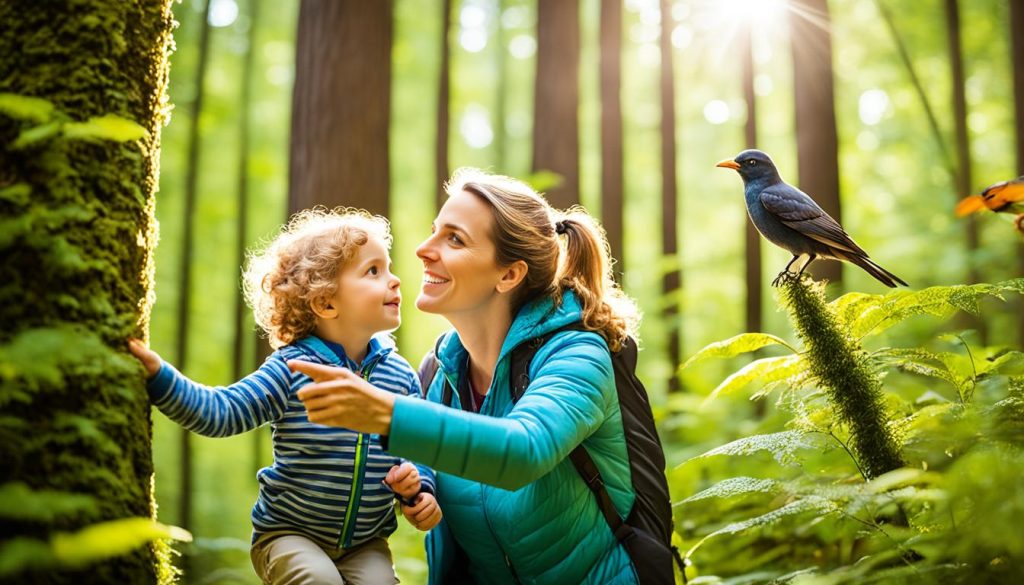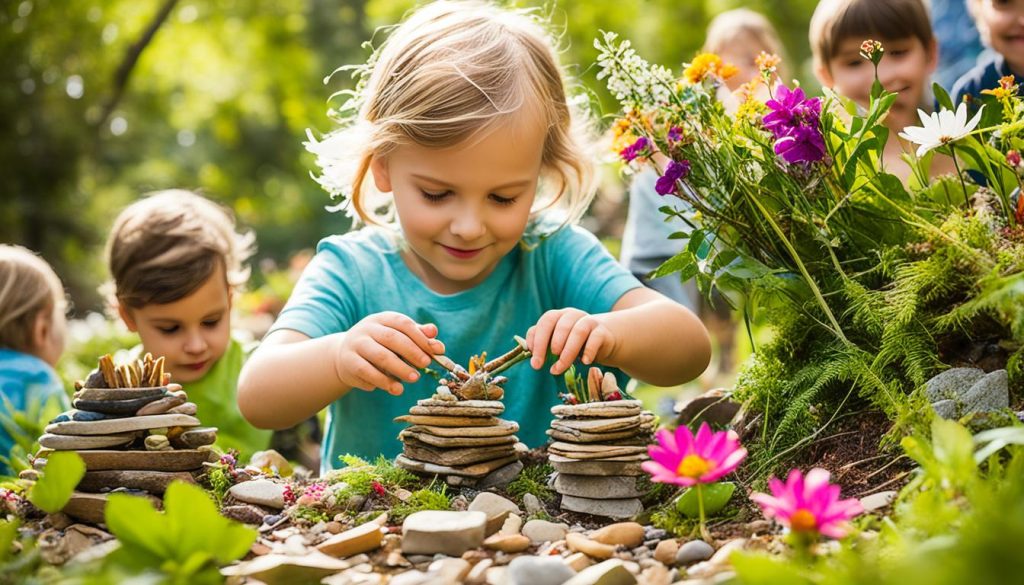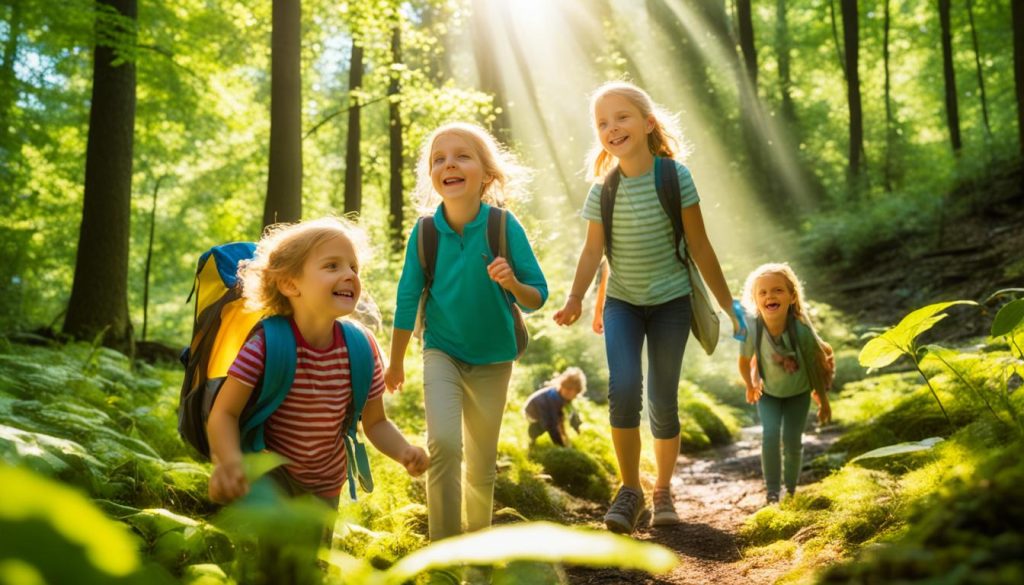Watching your child discover the beauty of nature is truly special. Moments like dipping toes in a stream or chasing butterflies can light up their world. But, many kids today don’t get to experience these simple joys.
In the U.S., 100 million people, including 28 million kids, are far from parks or green spaces. This lack of nature can be a challenge but also a chance to teach your kids about the environment. By encouraging them to explore nature, you help them develop a love and respect for our planet.
Studies show that nature has many health benefits. It can lower stress, improve balance, and help with motor skills. Even simple activities like walking barefoot can lead to better sleep and less stress. These experiences can greatly benefit your child’s health and their care for the environment.
To make nature a part of your family’s life, you need to make a conscious effort. It’s not just about weekend hikes. It’s about making the outdoors a regular part of your life and family culture. By showing your love for nature, you teach your children to value and protect it too.
Key Takeaways
- Nearly 100 million Americans, including 28 million children, lack easy access to parks or green spaces.
- Spending time outdoors can reduce stress and improve physical health.
- Activities like “earthing” can enhance sleep and lower stress levels.
- Exposure to nature boosts children’s balance and motor skills through engaging movements.
- Parents can foster a lifelong love of nature by modeling environmentally conscious behaviors.
Start with Lead by Example
In the journey of Positive Parenting, leading by example is key to teaching your kids to love nature. Show your love for the outdoors and let your child see how you respect and care for nature. A study in the Journal of the American Dietetic Association found kids follow their parents’ habits, like eating fruits and veggies.
Modeling Behavior
Your actions have a big impact on your kids. Show them empathy and love for nature, and they’ll likely do the same. This builds Family Respect and Empathy and helps them feel good about themselves. Seeing you enjoy activities like gardening or hiking makes a strong impression.

Getting Outdoors Regularly
Being consistent with outdoor activities is important. Make time for family hikes, picnics, or park visits to keep your nature connection strong. A Common Sense Media survey shows parents spend a lot of time on screens, so it’s key to spend more time in nature. This helps your kids feel better about themselves and strengthens family bonds.
| Key Activity | Impact on Children |
|---|---|
| Gardening | Encourages responsibility and appreciation for nature |
| Hiking | Promotes physical health and family bonding |
| Picnics | Improves mental well-being and creates treasured memories |
| Frequent Park Visits | Enhances social skills and interaction with the environment |
Showing your kids the value of being outdoors and connecting with nature gives them skills for life. This habit helps with Family Respect and Empathy and supports Positive Parenting.
Promote Creative Outdoor Play
Outdoor play boosts creativity in kids. It lets them explore and dream in nature. This helps them think innovatively and be independent. It also improves their health, happiness, and bond with nature.
Unstructured Playtime
Unstructured playtime helps kids be independent. They get to check out their world at their own pace. They can build things, make choices, and be creative, like making forts or finding their way through obstacles. These activities help them see things better and solve problems, which is good for them.
Building Forts and Playing in Mud
Building forts and playing in mud are great ways to enjoy the outdoors. They make kids use their imagination and connect with nature. Building a fort teaches teamwork and talking well. Playing in mud helps kids use their senses, giving them a fun and grounding experience.

Try to make outdoor play a regular part of your day. Simple things like evening walks, biking, or visiting playgrounds can really help your child enjoy the outdoors more.
- Evening walks or quick bike rides can become a family ritual.
- Kid-friendly hikes are an excellent way to explore nature.
- Frequent trips to nearby playgrounds promote regular outdoor activity.
It’s important to mix structured and free outdoor play. Structured activities like sports or nature walks help with specific skills. Free play lets kids be creative and independent.
| Activity | Developmental Benefits |
|---|---|
| Building Forts | Enhances teamwork, creativity, and problem-solving skills. |
| Playing in Mud | Boosts sensory development and encourages imaginative play. |
| Evening Walks | Reduces stress and improves mood. |
| Quick Bike Rides | Promotes physical health and eye strength. |
| Kid-friendly Hikes | Fosters curiosity and observational skills. |
| Exploring Playgrounds | Increases social interactions and cooperation. |
Make Everyday Activities Nature-Inspired
Adding nature to daily tasks, like eating outside or making crafts, helps kids connect with nature. Moving activities outside makes the switch from indoors to the outdoors easier. It shows how simple tasks can be made better and strengthen the bond with nature.
Dine Outside
Eating outside can change the way a family connects. It boosts Parent-Child Communication and is great for Teaching Kids Responsibility. Tasks like setting up the picnic, making food, and cleaning up teach teamwork and responsibility. Plus, the fresh air and calm setting can make meals more enjoyable.

Outdoor Crafts
Outdoor crafts are a great way to bring nature into daily life. They help with Developing Healthy Habits in Kids and boost creativity and curiosity. Kids can make art with leaves and stones or sculptures with branches and twine. These activities let kids explore and learn about their surroundings, making their experiences richer.
| Benefits | Statistics |
|---|---|
| Mental and Physical Well-being | Being in nature is better for mental and physical health than staying indoors. |
| Enhanced Attention and Focus | Nature helps reduce mental tiredness, making kids more focused in school and at home. |
| Reduced Anxiety and Depression | Activities like forest bathing lower anxiety and depression, helping with recovery. |
| Improved Social Skills | Playing outside with kids of different ages helps them learn social skills. |
| Better Sleep and Mood | Sunlight, fresh air, and exercise make kids happier and help them sleep well. |
Explore New Natural Spaces Together
Exploring new natural places sparks the imagination and leaves a lasting mark on a child’s view of the world. By going on trips, whether nearby or far away, you can help build a Growth Mindset for Kids. A 2018 study in the United Kingdom found kids spent about four hours outside each week. This is roughly half as much as their parents did when they were kids.

These experiences encourage Lifelong Learning in Children. They expose kids to different ecosystems and make them excited about exploring. This helps with personal growth and learning. Research shows kids who spend time in various natural places do better in school and think more critically.
Playing in nature helps kids understand risks and limits, which is key to Role of Play in Child Development. Studies show kids who play outside are smarter, happier, more focused, and less anxious than indoor kids. Regular trips to nature can make kids love the outdoors early on. This sets the stage for a lifetime of learning and growth.
| Benefits | Evidence |
|---|---|
| Improved Cognitive Functioning | Studies show children who spend time in nature have better cognitive functioning and mood. |
| Reduced Stress and Anxiety | Playing with dirt and engaging in nature has shown reduced anxiety and stress levels. |
| Better Academic Performance | Exposure to various natural environments leads to improved critical thinking skills. |
Educate About Flora and Fauna
Teaching kids about the plants and animals around them makes their outdoor time better. By learning about different species, they understand and respect their environment more. This helps with important Child Development Milestones.
Identifying Plants and Animals
Identifying plants and animals is a great way to teach kids about nature. Kids love to explore and learn about living things, showing their unique Child Learning Styles. By doing this, they learn about the variety of life on Earth and how to care for it.
Using Books and Guides
Books and guides can make kids’ knowledge even better. “I am Jane Goodall” and “The Watcher: Jane Goodall’s Life with the Chimps” are great choices. They make kids want to learn more and connect with nature. These activities also teach them to respect nature.
Toys like shockproof binoculars and bug viewers help kids observe closely, fitting different Child Learning Styles. With these tools and guidance, kids can explore safely and responsibly.
| Activity | Benefit |
|---|---|
| Nature Walks | Improves attention span and concentration |
| Bird Watching | Fosters patience and observational skills |
| Using Field Guides | Enhances species identification and knowledge |
| Hands-on Experience with Plants | Increases appreciation and understanding of flora |
Connect Through Storytelling and Books
Adding nature-themed books to a child’s reading list makes their outdoor adventures more imaginative. It helps them think creatively, understand feelings, and stay mentally healthy.
Nature-Themed Stories
Reading books about seasons, animals, and outdoor adventures connects stories to real life. This helps kids use their imagination and enjoy their favorite stories more.
Stories and reading teach kids the importance of books and stories. Doing this every day helps with language and reading skills, which are key for school.
Young kids love stories with rhymes, rhythms, and repeats. Nature-themed stories are fun and teach them something new.
Relating Outdoor Activities to Stories
When kids do outdoor activities like the ones in their books, they learn more from the stories. This helps them feel for characters and supports their mental health by building positive feelings towards nature.
For instance, stories about explorers might make your child want to explore their backyard. It encourages them to be imaginative and active. Stories with moral lessons help them understand right and wrong, which is good for their feelings and decisions.
Reading one book a day is a simple way to help your child grow, bring your family closer, and keep a love for nature and reading alive.
Engage the Senses
Introducing kids to nature through touch and sound is a great way to grab their attention. It helps them learn about the world in a way that’s different from screens. This approach is great for cutting down on screen time, helping kids be more independent, and making the bond with parents stronger.
Touch and Feel Different Textures
Ask your child to touch and feel different textures, like tree bark or a pond stone. This helps them learn about the world by touching it. It’s a key part of growing up independent, letting them explore and understand nature.
This hands-on learning creates lasting memories and brings you and your child closer. You both get to discover new textures together.
Listen to the Sounds of Nature
Listening to nature’s sounds is another great way to engage kids. Sounds like leaves rustling, birds chirping, or a brook babbling offer a peaceful break from screens. These sounds help kids feel calm and curious.
Sharing these moments with your child helps manage screen time. It also strengthens your bond through quiet, shared experiences.
Experts say adding these sensory activities to your routine is key. They help balance screen time with independent exploration and a closer relationship with your child.
For tips on talking about tough topics with your child, check out expert advice online.
Gardening as a Family Activity
Gardening is a great way for families to bond and learn important life lessons. It’s a tradition that strengthens family ties and helps kids develop emotional and social skills. Kids who garden do better in science because they learn by doing.
Gardening is a mindful activity that teaches kids about responsibility and sticking with things. It helps them understand the effort needed to grow plants from seeds. This can reduce tantrums and stress for everyone in the family. Just 30 minutes of gardening can make people feel happier.
Kids who grow up around farms or garden often have fewer allergies and health issues. This is because they’re exposed to good microbes and fungi in the soil. When parents garden with their kids, it makes the kids more likely to enjoy it too. In fact, kids are 65% more interested in gardening if their parents are involved.
| Benefits of Family Gardening | Impact |
|---|---|
| Higher Science Test Scores | Children who garden perform better on standardized tests. |
| Improved Eating Habits | Children who grow their own food are more likely to eat it. |
| Health Benefits | Reduced respiratory allergies and asthma. |
| Mental Health | Family gardening decreases stress levels by 40%. |
| Physical Activity | Gardening involves stretching, bending, and other motor skills. |
Gardening helps kids develop resilience and problem-solving skills that last a lifetime. Families that garden together usually spend 2-4 hours a week doing it. This time together is important for a balanced family life.
Join Community Nature Programs
Joining community nature programs is a great way to make your kids love nature. Activities like local nature clubs and family hiking groups help kids grow their social skills. They also help them connect with nature without using digital screens.
Local Nature Clubs
Local nature clubs are perfect for the whole family to enjoy nature together. They offer educational workshops, guided walks, and hands-on activities. These activities can make kids more interested in the natural world.
Being part of these clubs helps balance work and family life. It also helps kids develop social skills by meeting other kids who like nature.
Family Hiking Groups
Family hiking groups are great for regular outdoor fun. They let kids explore nature’s beauty and complexity. These hikes make family bonds stronger and teach kids important social skills.
Being in these groups also helps parents manage the challenges of the digital age. It offers a break from screen time and brings more green time into life.
Research backs the benefits of these nature programs. For example, 26 mothers and daughters in the U.S. said that nature activities improved their communication and well-being. Studies also found that kids who spend time outdoors prefer natural environments as adults.
Conclusion
Teaching kids to love nature gives them important life skills and helps them feel emotionally strong. By doing activities together in nature, you help your kids grow into positive people. These activities also make memories that bring your family closer.
Using positive parenting when you’re in nature helps reduce fights between siblings. It makes kids work together and behave better. Going to parks, hiking, or gardening can teach kids to be thankful for the world around them.
Adding nature to your daily life makes your child curious and respectful of the earth. It also makes your family bond stronger. By doing this, you help your kids do well in life, feeling good about themselves and their place in the world.
FAQ
Why is it important to encourage a love of nature in children?
How can I model positive behavior towards nature for my child?
What are some creative outdoor play activities for kids?
How can we make everyday activities nature-inspired?
Why is exploring new natural spaces beneficial for children?
How can I educate my child about flora and fauna?
How does storytelling and books enhance a child’s connection with nature?
What sensory activities can help my child engage with nature?
How does family gardening benefit children?
What are the benefits of joining community nature programs?
This post contains affiliate links. If you click on a link and make a purchase, I may earn a small commission — at no extra cost to you. Thank you for supporting this blog and helping me keep the patterns free! Read the full Affiliate Disclosure & Transparency.
